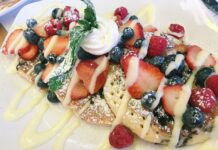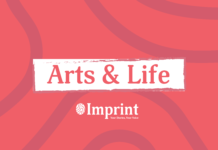Students and community members alike filled Modern Language’s Theatre of the Arts Wednesday evening to take part in Conrad Grebel’s event, “Teaching Peace in the Face of Danger.” The event featured several speakers, most notably Ziauddin Yousafzai.
Yousafzai is the father of Malala Yousafzai, who gained worldwide attention after being shot three times in the head by the Taliban in 2012 for advocating for women’s right to education in Pakistan. He has long been a supporter of education and an advocate for women’s rights.
The first to the podium was Jahan Zeb a founding member of Global Peace Council Canada (GPCC). GPCC is an NGO, the idea for which was born out of Global Peace Council Pakistan (GPCP), which is in its beginning stages at the newly opened Centre for Peace Advancement at Conrad Grebel. The goals of the company are to foster peace-focused education, work with the Yousafzai family to generate a dialogue about issues of global education, and offering multiple types of support to scholars in Canada and Pakistan. A team of UW graduate students created the founding documents for the organization.
Next to speak was Lowell Ewert, the director of peace and conflict studies at UW. Ewert was one of the key supporters of the students who worked on the documents for GPCC.
“I first met Ziauddin Yousafzai in April when he visited our campus and challenged us to become more involved with organizations with which he’s associated, to advance the cause of peace,” Ewert said.
The main event of the night, Yousafzai’s speech, began with an anecdote from his childhood. He spoke of growing up in Swat Valley in Pakistan, detailing the difficulties of living without working plumbing, and the way that children, when relieving themselves at night, would have shouted conversations with their family members so as not to feel afraid of the darkness and the silence.
He compared this story to the situation he and his family were faced with under Taliban rule in Pakistan: speak or be silent.
“When you break the silence it strengthens you,” Yousafzai said.
He spoke of his experience living under the Taliban, citing a poem by Martin Niemoller about the Holocaust. The first and last verse read: “First they came for the socialists, and I did not speak out — Because I was not a socialist … Then they came for me — and there was no one left to speak for me.”
“They started targeting all police, slaughtered them, hanged them upside down, and many people said ‘It’s okay, police are police, we are not the targets, we are not the victims.’ … Then they started taking money from rich businessmen; still people said ‘It’s alright,’” Yousafzai said.
He spoke about his family, both his wife (“She is the real power behind her daughter and her husband”) and his daughter, with whom he shares the 2014 Nobel Peace Prize.
A discussion panel followed Yousafzai’s address. In addition to him, three others took questions from audience members.
The other members of the panel were Nazia Zeb, a Pakistan native who is now pursuing a degree at UW as well as working with women in Hamilton; Ahmad Shah, a teacher and founding member and president of GPCP; and Aly Ostrowski, peace and conflict studies masters student who worked on the GPCC founding documents.
The subjects of the audience’s questions were varied, ranging from how to deal with being discouraged by the overwhelming nature of a problem, to ways to inspire changes in Canadian attitudes on a structural level, to when the Yousafzai family plans to return to Pakistan (hopefully some time next year).
After the event, audience members asking questions, taking photos, and hoping to engage him in further discussion immediately surrounded Yousafzai.
He will be continuing his work with UW’s Centre for Peace Advancement, supporting the CPCC in its endeavours to propel peace education worldwide.
Ewert said, “The need for more effective peace education is evident every time we open a newspaper and read about the situation in the Middle East … what has emerged through our conversations [with Yousafzai] is a sense that there are several activities that we can do together, that we need to do together. Peace is interconnected, we are all in the same boat.”






























